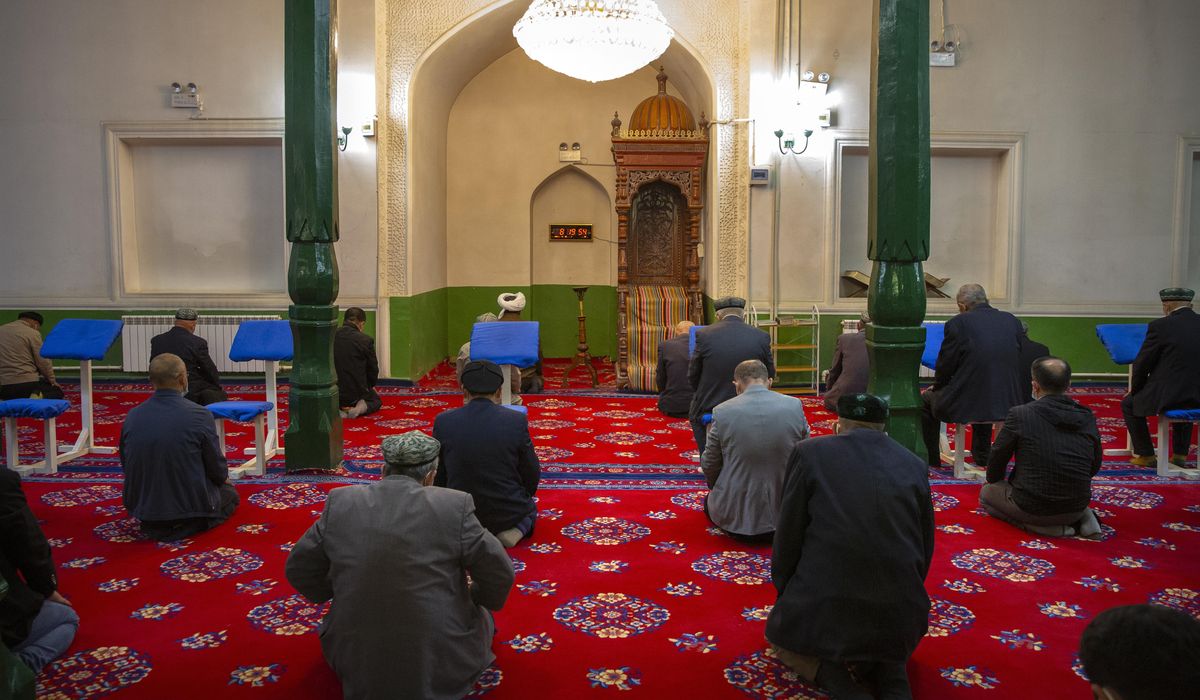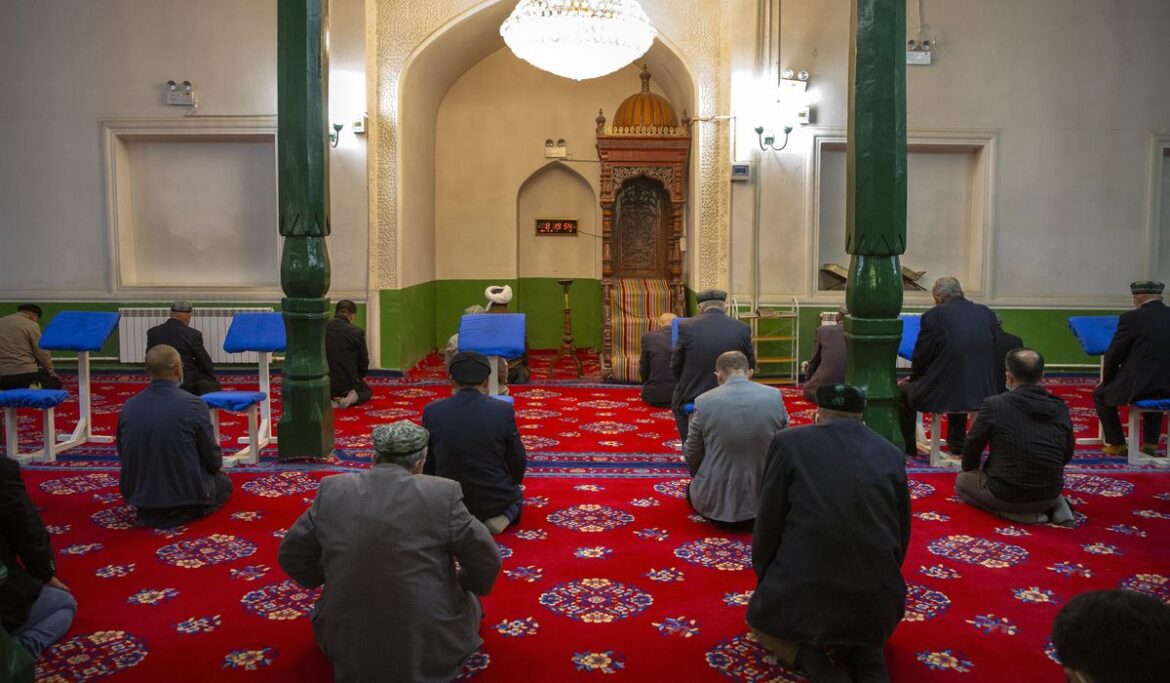
China is engaged in a global influence and disinformation campaign, including the use of artificial intelligence-generated fake images, aimed at countering reports of repression against minority Uyghurs, according to a State Department report made public Wednesday.
The report by the Global Engagement Center, the counter-disinformation unit, concludes that China is actively manipulating international discussion of “ongoing genocide and crimes against humanity conducted against predominantly Muslim Uyghurs and members of other ethnic and religious minority groups in the Xinjiang Uyghur Autonomous Region,” in a coordinated effort to amplify Chinese narratives that no genocide is taking place and to harass Beijing’s critics.
“Despite these efforts to distract from the situation in Xinjiang, independent media outlets, academics and human rights activists have published multiple eyewitness accounts and verifiable data that [China] has imprisoned an estimated one million people and that credible evidence exists of torture, forced sterilization and other abuses,” the report said.
The messaging involved “flooding” international information outlets in an attempt to limit critical coverage of Chinese repression.
Chinese Embassy spokesman Liu Pengyu said assertions of forced labor and genocide in Xinjiang are “vicious lies” spread by anti-China forces. All ethnic groups in China “enjoy happy and fulfilling lives,” he said.
“It is the U.S. government that has been spreading false information and lies,” Mr. Liu said. “What China is doing is telling the world the truth about China’s Xinjiang region.”
SEE ALSO: Another pro-Putin figure killed in car bombing days after Moscow attack
The State Department formally declared China engaged in genocide against Uyghurs in western China in January 2021 in the final days of the Trump administration.
The new report Wednesday said Chinese “messengers use sophisticated A.I. -generated images to create the appearance of authenticity of fake user profiles,” adding that China also utilizes agents to “silence dissent by engaging in digital transnational repression, trolling and cyberbullying,” while spreading propaganda promoting “counternarratives, conspiracy theories and unrelated news items.”
Chinese government social media accounts, state-linked media, private accounts, and robotic “bot clusters” are helping in the campaign,” operating “on a global scale in at least a dozen languages,” the report said.
The Chinese actors engaged in what the report called “astroturfing” – coordinated campaigns of fraudulent posts that seek to create the illusion of widespread public support for Beijing’s policies when no such support exists.
“Similar to flooding, the [People’s Republic of China] uses astroturfing to inundate the information space with ‘positive stories ‘ about Xinjiang and the Uyghur population, including manufactured depictions of Uyghurs living ‘simple happy lives,’ as well as posts emphasizing the purported economic gains that the PRC’s policies have brought to Xinjiang,” the report said.
In mid-2021, more than 300 inauthentic accounts had posted more than thousands of hours of videos of Uyghurs appearing to deny abuse by Chinese authorities.
The videos attempted to show that people in Xinjiang disagreed with international media’s depiction of life in Xinjiang. Most of the videos originated on controlled Chinese sites and were then spread to YouTube and Twitter.
The Chinese are also using images produced by a machine-learning program called StyleGAN to fashion realistic profile images for fake media accounts. The software produces composite images of people that cannot be traced to original photos, thus making identification of the fake account more difficult for social media monitors.
The fake accounts argue the alleged atrocities in Xinjiang were a fabrication of the United States and its allies.
The regime’s campaign targeted Chinese communities outside the country using both online and physical harassment to prevent them from sharing their personal stories, or to force them to self-censor their experiences.
“Trolling campaigns are designed to silence those who speak out against the PRC, to poison the information environment with bad-faith arguments, and to silence opposing viewpoints,” the report said.
“Trolling campaigns frequently evolve into threats of death, rape, or assault; malicious cyber-attacks; and cyberbullying or harassment through doxxing — publishing an individual’s personal information online without their permission, including their full name, home address, or job.”
The Chinese also aggressively deny and rebut criticism from Western media and private think tanks. This involves “a wave” of official Chinese Communist Party-affiliated media and bot networks, in one case showing mechanized cotton harvesting in Xinjiang in claiming forced labor by Uyghurs is not needed.
The cotton reports sought to counter reports that Chinese authorities moved 100,000 Uyghurs from Xinjiang in “coercive labor placements” in factories around China.
The spreading of fake positive stories “aims to divert attention from reports regarding the PRC’s ‘demographic engineering’ campaign” that aims to boost ethnically Han Chinese in diluting the Uyghur population, a Turkic ethnic group that is predominantly Muslim.
Online trolls have taken a leading role in “attacking, stirring controversies, insulting, and harassing netizens to poison the information environment and distract from narratives critical of the PRC,” the report said.
Chinese media involved include outlets linked to the ruling Communist Party such as China Global Television Network, China Daily, China Radio International, and Xinhua.
China also is partnering with foreign media, including in Kenya, that publish pro-China accounts in an effort to boost the credibility of the messaging campaign, the report said.
Adrian Zens, senior fellow at the Victims of Communism Memorial Foundation, has extensively documented Uyghur repression, including through the release of internal police files that highlight the abuses. The State Department report said China is focusing its Uyghur disinformation on younger people in a bid to make the messaging go viral online.
The Chinese military is also engaged in the campaign.
The People’s Liberation Army is operating Internet trolls on the issue to attack critics online, as are the Central Cyberspace Affairs Commission, and the Communist Youth League.
“The PRC’s Cyberspace Affairs Commission and Central Propaganda Department directly employ an estimated 2 million people nationwide in this capacity and another 20 million working as part-time ‘network civilization volunteers,’” the report said. “These forces target the PRC’s domestic audience and Chinese-speaking diaspora communities.”





